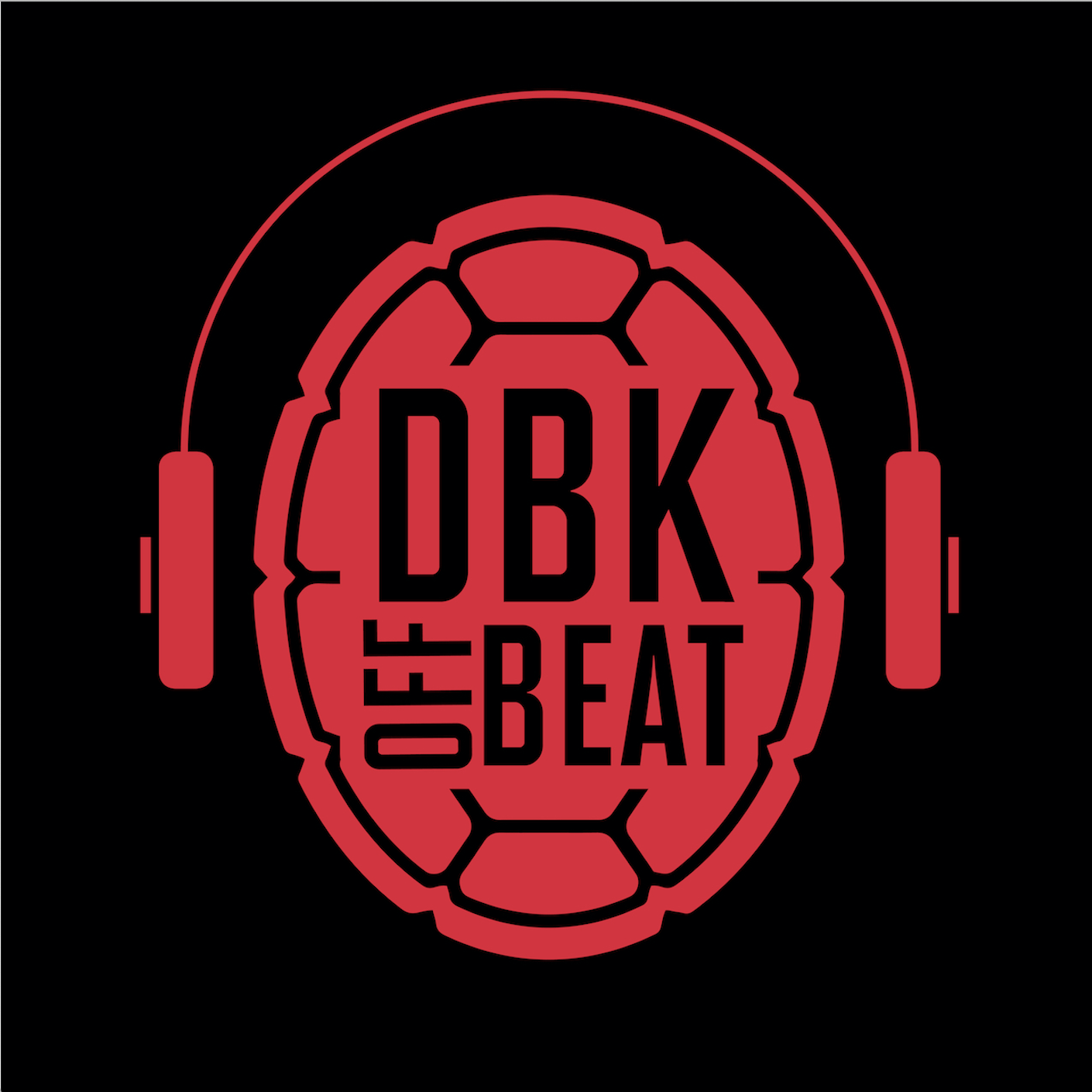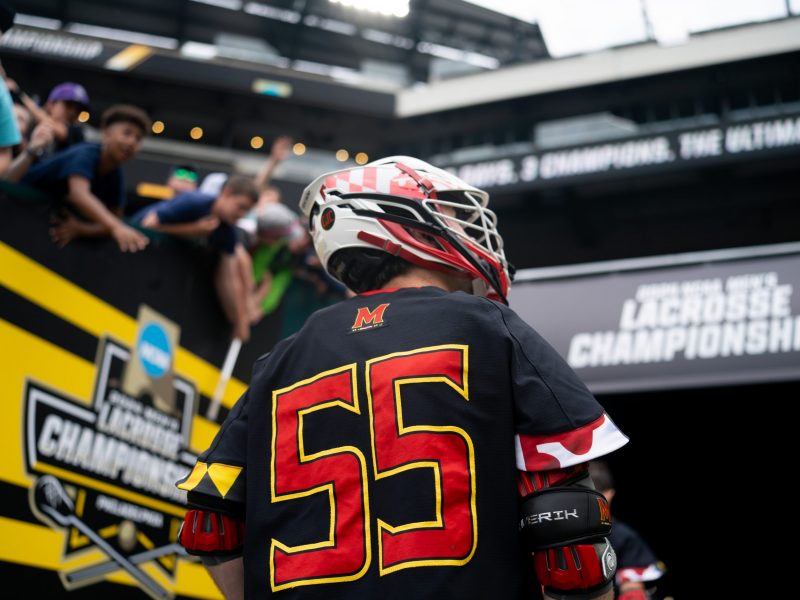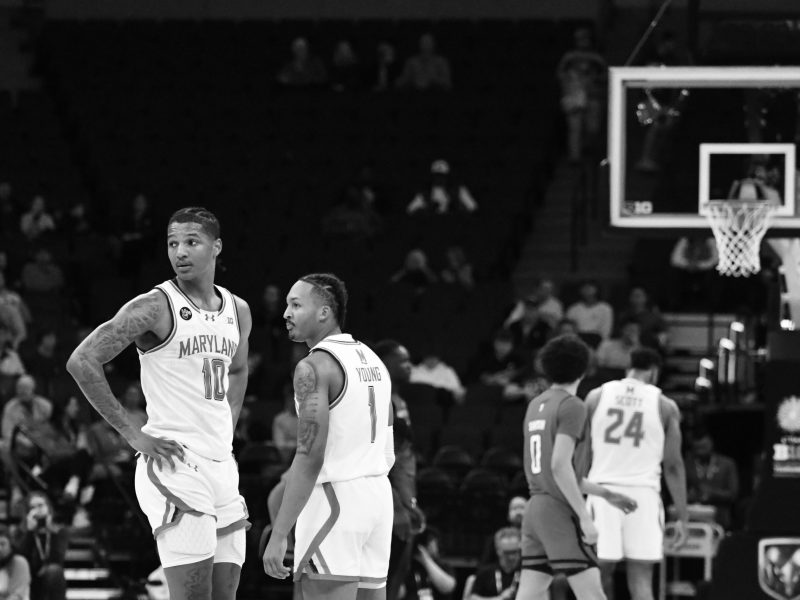College is for exploration, learning, maturing … and finding out what you want to do for the rest of your life. Career fairs and job interviews are stressful for everyone, however, for some students resumes and cover letters are not the only things that they think about.
Hair discrimination happens across the United States in not only jobs, but schools as well, disproportionately impacting African Americans. This episode the Diamondback brings you along to hear the stories of other students who discussed how their hair impacted their decisions and identity. Offbeats’s Grace Kpetemey tries to unpack some of the confusion, stigma and misunderstandings of black hair in today’s episode.
You can find us on Spotify and Apple Podcasts. A full transcript for this episode is below.
OFFBEAT: IT’S MORE THAN JUST HAIR
[COLD OPEN]
NAOMI LEE: I did the big chop when I was 17 around. I think I was a junior in high school, and everyone was telling me, “Don’t do it, don’t do it. You’re not going to like your natural hair.” I even got that from my own mother. Which, you know, it makes sense because you know, Black women were told, “Your hair is disgusting. Your hair is this it’s unprofessional.” So I understand where everyone was coming from, but I was just saying.
[MUSIC]
GRACE KPETEMY: You just heard from Naomi Lee, a recent graduate of UMD about her natural hair journey. Now in the second month of the school year, the uncertainty of the future only becomes more of a reality for upperclassmen. While the Career Center kicked off their annual career fair a few weeks ago, resumes and cover letters weren’t the only things some students on campus had to worry about. Hair was actually top of mind for more students than you think. And students with natural hair, worried about it in a different way.
GRACE KPETEMY: Welcome to Offbeat by The Diamondback, a podcast about the nooks and crannies of the University of Maryland. I’m your host Grace Kpetemy. Me, and today we’ll take you through the experiences of other students like Naomi’s whose hair impacted their identity. Before we hear the rest of the story, remember to stick around until the very end to debunk some natural hair myth.
[MUSIC]
GRACE KPETEMY: You may not know this, but a Black woman is 80 percent more likely to change her natural hair to meet social norms at work. According to a dub 2019 Crown research study. Earlier you heard Naomi Lee discussed the negative feedback she received about her natural hair and her personal life. While she also recounted to us how she was met with harsh treatment I work
NAOMI LEE: One time actually my first job at Staples, we had a new management just like takeover. And basically my GM came to me it was just like, “Do something with your hair you didn’t like take it back or corral it or something.” And keep in mind that was like when I had the big chop. So my hair was not as long and voluminous as it is right now. And the store has shut down after that. And so I didn’t really have to do anything. And it wasn’t really that bad because my GM had locks as well like down to his back. So he had to do the same thing as well try and control his hair.
GRACE KPETEMY: What Naomi described is far too common for Black women. In fact, Black women are 1.5 times more likely to be sent home, or no Black woman sent home from the workplace because of hair. According to that same Dev 2019 study. However, Niomi felt that she was receiving disparate treatment compared to her co workers who were never asked to alter their hair.
NAOMI LEE: I was taken aback I was just like, “You’re telling me this when you have the hair the bundles down your back going down.” I was I was confused. I was like, “What do you mean like, Hispanic guy is having voluminous hair right beside me and the only difference is hair is straight.”
GRACE KPETEMY: Regardless of the negative or harsh treatment, Naomi received throughout her personal and professional life. She’s happier living authentically with her natural hair.
NAOMI LEE: I felt like my hair is standing up. It’s closer to God as they say. And when I did that big chop I was just like Hurray. Like I can style
GRACE KPETEMY: Naomi described a process which many women like her have undergone to get their natural hair back. They may cut parts of their hair off that are chemically processed to allow their natural hair to grow back without any kind of texturizer there are different ways Black women and men can wear their natural hair, including braids, bantu knots, dreadlocks or even twist which are all forms of protective styles. I sat down with a hairstylist who works at a salon just above the bustling shopping center near South Campus. And we discussed the many nuances and untold truths of women who wear their natural hair.
WYNETTE ANDREWS: My name is Wynette Andrews. We are at hair and space blow up bar located in College Park and my position here amongst being a stylist is also the manager
GRACE KPETEMY: When you hear the word natural hair. What does that mean to you?
WYNETTE ANDREWS: So many different definitions. I guess the most accurate one would be your hair gone in most natural states minus any color any product as in like chemical changes to the hair texture that is like the main idea of natural hair. What’s interesting is my since I’ve been in the hair industry which has been like 15 years now it was natural hair wasn’t the main concept. relaxed hair was and the shortcuts and that was my exam.
WYNETTE ANDREWS: I always got my hair relaxed. And what I love to see is that we are becoming like our are the women of our, I guess our generation have become one with themselves like they are loving their natural state, especially for the younger generation seeing these girls embracing their natural curls, and they’re seeing it on TV, and they’re seeing those these women walk around. And they were just looking absolutely beautiful and gorgeous, versus the concept that we had to wear our hair bones straight.
WYNETTE ANDREWS: Like with that said, girls with natural hair are embracing their curls, and building their confidence in their natural state, the widest self confidence even matter when it comes to hair discrimination.
GRACE KPETEMY: Well, to find the answers, I sat down with Kris Marsh, a sociologist and associate professor at the University of Maryland to hear more about what hair discrimination actually is.
KRIS MARCH: When we specifically think about hair discrimination. You think about hair that is predominantly in African American communities, or a part of African American or Black, we’re going to call it black, a part of Black culture that is considered unprofessional, but hairstyles that might be unique to other cultures or other racial ethnic groups are not considered unprofessional. So to decide that some are considered professional based on like cultural differences and others are not. That’s where you start to see the discrimination. And that’s how discrimination kind of plays out. Because you have a lot of hairstyles that really are unique to black communities. And they’re the ones that are considered unprofessional.
GRACE KPETEMY: It’s not just women with natural hair that experience this kind of discrimination. Men are also subjected to this kind of treatment. Senior Lucban had had his first internship this past summer, where he began to consider what his hair means to him. Luke Bennett,
LUKE BENNETT: I’m an information systems major. I am a pro advocate of locking your hair. So anyone who wants to lock their hair, just do it, you know, it’s a great experience. I mean, I don’t know if he will see this ugly stage, I don’t see that. I mean, every stage is different. And I just really think it’s a, it’s since it’s like, you know, you grow with it, it’s kind of like, you get to look back and just like, man, it’s like, it’s really cool. Just looking back at like looking at old photos, like man was heroes like this. And like, certain parts of your life, it’s just like, it’s like kind of goes with like how your locks are growing. So
GRACE KPETEMY: The style that Luke is referring to is dreadlocks, also known as locks or dreads and their rope, like strands of hair that are formed by locking or braiding hair.
LUKE BENNETT: I always have this thought, like, when I started my locks, I was like, Okay, once I like graduate, I’m gonna cut them off, because I gotta be in like, the corporate setting, and that just won’t work and stuff like that. And that was just like, the thoughts I had. It wasn’t really like a I wasn’t sad about it was just like, Oh, something I have to do. But lately, I’ve been kind of feeling against, you know, if people don’t want me for my locs I don’t know if that’s like the company I want to be at. I mean, that’s definitely like, it’s easier said than done. Because I know that like, I mean, I haven’t really gotten any too weird, like, looks about my hair, but I know like, maybe there’s a few times where people Oh, like, you can just maybe sense it, even if, like, no one is really sending the verbally sent anything. But I mean, I hoping to work for a company like I’ve like value like my hair and things like that. So I wouldn’t want to just like cut it off just to like work somewhere I want to if I do cut it off, it says I want to not because like, I feel like pressure to do so anyway.
GRACE KPETEMY: While, policies such as the crown Act may prohibit workplace discrimination, professional settings are not the only place that Luke feels targeted for his hair.
LUKE BENNETT: But I do think there’s like a, you know, people seeing like, locks like, you know, on Black man, it’s like, it’s aggressive thing. And I mean, I think I can I don’t agree with that. But sometimes I do feel that like sometimes if I maybe in going places, I’m just like, I go into stores or something like that. I just like make sure to like not really like do anything like that would seem aggressive just because like, you know, he’s like, Oh, you got like locks on so you just don’t want to just appear that way. Like I just tried to do this keep to myself kind of thing.
LUKE BENNETT: If maybe if like I’m going on, like I see like the elevator open and maybe it’s like some not right usually white men maybe mostly white women, I usually I’ll just take the stairs like that instead just because it’s just like, I don’t know, just don’t feel like I don’t know, it’s weird because it’s like, nothing inherently is wrong, but it just feel I just like actually will just like do that. Just like I don’t really let it kind of engage or things like that. So I just like make sure just kind of stay away.
GRACE KPETEMY: This feeling of needing to alter your hair to look professional, or that your hair can make others uncomfortable, was a running theme for many of the students that we talked to. Sociologist Kris Marsh, also shared with us about her training with the police department on what styles could and could not be worn at work.
KRIS MARCH: I do training with police departments and the police department that I currently work with they had a general order that said three hairstyles were considered unprofessional. I remember I remember if I’m if If I remember correctly, the three hairstyles were cultivated locs dreadlocks and cornrows were considered unprofessional now and Black America those are considered like protective hairstyles, but a a what is it called a French braid, or a lobster tail is considered professional because that’s you sees more so in white communities, but cornrows, I cultivate a lot because I’m not even sure what those are and dreadlocks are considered unprofessional highly problematic.
GRACE KPETEMY: Policies like this that exists throughout schools or jobs only strengthen the sort of culture that Chris told me about. It’s a culture that may inhibit people like Luke or Naomi to feel comfortable in presenting themselves in a way that they want. The Crown Act is a policy which stands for creating a respectful and open world for natural hair. And the law is meant to inhibit moments where racial discrimination based on hair texture occurs.
STEPHANIE SMITH: I am delegate Stephanie Smith I represent the 45th Legislative District, which is East Baltimore, northeast Baltimore City. And I just finished my first term and just got reelected going into a second term next year. While I was in law school, I got to meet a gentleman named Oliver Hill. He was salutatory. In two Thurgood goods valedictorian, he was always right there. And I think in legal circles, he was well known and well respected by a lot of everyday people do not know who Oliver Hill is. And so we were holding an ice cream social on campus for him. And I remember he’s eating his ice cream. And we’re thinking, what made you know, a young Black man or a woman think law school 1930. You know, this is what I need to do with my life. I mean, this is a big thing. And without missing a beat, he’s like, Oh, I went to law school to end segregation. The issues that gave rise to the, you know, the policy intervention of the crown act, really looking at it as how do we tackle racism as it evolves, because discrimination doesn’t manifest manifests traditionally, in as many obvious ways. Now, as they did on Oliver Hill and Thurgood Marshall are taking Jim Crow to task.
GRACE KPETEMY: For Stephanie. This comes from a personal place, as she wears her hair and locks, and has experienced this type of discrimination firsthand. She’s even had it perpetuated by members of her own community. And she also told me about the experiences of others that have inspired her to advocate for the Crown act.
STEPHANIE SMITH: There’s a documentary not very long one on Netflix about Abercrombie and Fitch, I don’t know if you’ve seen it. It’s really good. It talks about essentially all the people of color that had to participate in a class action lawsuit against Abercrombie for discriminating against non white, you know, staff, Abercrombie. But one of the things that I thought was interesting is that they were very devoted to hiring attractive people. I mean, you don’t really see ugly people working at Abercrombie. And that’s whatever, you know, but their handbook literally had like pictures of was attractive was not attractive. And a picture of a Black man with locks was not attractive, like so. This is the reason why you need a crown act, because a national retailer did not even blink, about suggesting that someone who has this hairstyle is not suitable to fold into things like that was just a very obvious above ground assessment of you know, but how many times was someone being denied something and not even realizing it was tied to their self expression. So So one of the critical hallmarks of the crown Act is that it requires the law to find a provision that allows the definition of race to be expanded to include natural or protective hairstyles.
GRACE KPETEMY: Right now the crown Act has been passed by the House and it’s waiting on the Senate. Maryland is one of 18 states that have passed a crown act at the state level. It passed in the House of Representatives with 235 votes with 189 Congressman voted against it. However, many Republicans like Lauren Gilbert, who called the bill a bad hair bill on the House floor, don’t support the law. She’s not the only one who has strong views against the bill. Republican Jim Jordan from Ohio had much more to say about the priorities of Congress.
JIM JORDAN: A million illegal crossings in one year on our border fact we don’t really have a border. We have went from safe streets to record crime in every major urban area in one year’s time. And they’re focused on a bill to make conduct that’s already unlawful, unlawful again, I guess, I would urge a no vote. Let’s focus on the issues that I think the vast majority of American people want us to focus on, like crime, like the high inflation rate the 40 year high inflation, right like the border problem, like the fact that we were an energy independent country just a few months back. Let’s focus on those issues.
GRACE KPETEMY: Representative Andy Harris from kokis. Ville, Maryland, also voted against the bill. Osby did try to request an interview with him, but his office declined the opportunity. While some Republicans think that this bill may be redundant, groups like the ACLU and Joy Collective insists that the law serves an unnecessary purpose. Title Seven of the Civil Rights Act of 1964 prohibit racial discrimination. But federal courts have said that only afros are protected. So there’s no federal statute that protects Black hairstyles, such as locks, knots, braids, and twists. Sociologist Kris Marsh, who we heard from earlier, explains why a federal law is needed, in addition to the policies already in place.
KRIS MARCH: And so people who are in position and power, they’re the ones that determine what professional is if you come to come to work and you there, they don’t understand your protective hairstyle or they don’t understand your natural hair, they automatically deem it as appropriate. And the way you’ve been seeps into, like the larger society is to say, Okay, if it’s not professional, then it’s not acceptable in the workspace. And it’s also not in the labor market. The workspace is also not accepted in the largest society organizations, we think of the workspace as a microcosm of the larger society.
[MUSIC]
GRACE KPETEMY: Among the discrimination, Black men and women face wear their hair, there are a lot of myths floating around that many people are not aware of, and still believe are true. Wynette and Camille of hair and space salon dived into some myths that have been circulating for generations, when that helped me debunk the first myth. Natural hair isn’t professional.
WYNETTE ANDREWS: So sad that we’ve, we put that mentality out there. And it stems from a lot of background in our history period, as to what is professional and what is not. It’s professional. And I don’t believe that our hair should be the first thing anyone even pays attention to my credentials for why I’m even into this position to why I got this job and whatever else that follows behind that. And can I do my job while wearing my hair? Yes. Oh, then what is the problem?
GRACE KPETEMY: I also sat down with senior Tania Booth, she discusses how she struggled with her natural hair and how she was perceived.
TANIA BOOTH: Well, I don’t see how it could be unprofessional because I feel as though act professionally. And my hair is something that’s a part of me. So I would assume my hair is professional as well.
GRACE KPETEMY: Next, Camille helps debunk a cultural myth that black women cannot grow long hair,
CAMILLE: Curly hair grows. Like you know afros. Look, they grow out instead of growing down. So like, the Caucasians, their hair goes down. So you see that so much faster than our hair, our hair can grow? Definitely, it can grow really quickly, too. Don’t don’t think it won’t. Because it can. It just needs the proper nutrients to do.
GRACE KPETEMY: One particularly harmful myth that has circulated for generations is that natural hair isn’t beautiful.
TANIA BOOTH: Um, I feel as though like when my hair is straight, or when I have like a protective style and a longer protective style, that I get more like male attention. And I I don’t know, like sometimes I just feel like people treat me like I’m taking more seriously almost. And like, I’m just more accepted and more like seen as feminine too. But when I have like my natural hair out, I feel like I’m kind of like disqualified, almost like from a lot of things. Um, it just feels like, I’m not accepted for who I am, like, I need to change myself or I need to change like a part of me, which is really hurtful because it’s just, that’s just how I am like, I didn’t choose my hair. You know, it’s just the hair that I was born with.
CAMILLE: But any Black hair, if you had alopecia is beautiful. If you have thinning, it’s beautiful. Like every Black girl’s hair is beautiful, like I’m just gonna keep repeatedly saying because like, if you don’t transition your hair if you don’t, if you don’t have to go natural, you can stay relaxed so your hair is still beautiful it’s beautiful. Black is beautiful, like any type of curl coil anything
GRACE KPETEMY: Thanks for listening to Offbeat I’m your host Grace Kpetemy. This episode is brought to you with the help of our editor Julia Bishoff and our two reporters Meghan Barnes and Fatima Yazdi. Our music this month is by fat sounds follow Offbeat on Twitter at @DBKOffbeat and follow The Diamondback on Twitter and Instagram @theDBK. You can find a transcript of this episode at dbknews.com. And if you liked this episode, tell your friends and tune in next time!
The following music was used for this media project:
Music: Sadness by Phat Sounds
Free download: https://filmmusic.io/song/9980-sadness
License (CC BY 4.0): https://filmmusic.io/standard-license
Artist on Facebook: https://www.facebook.com/PhatSounds74



